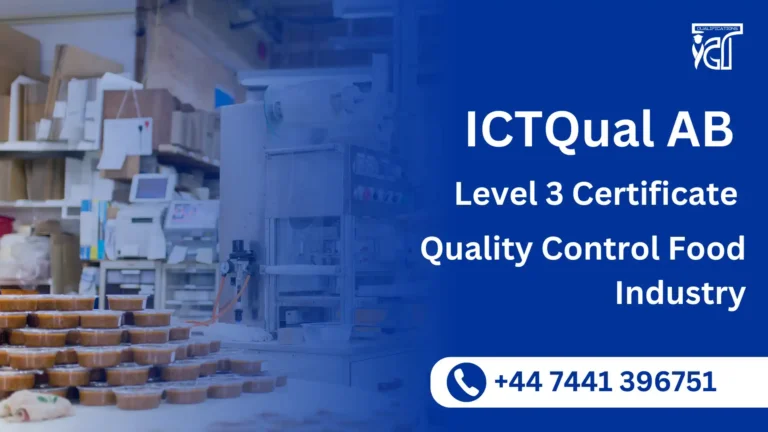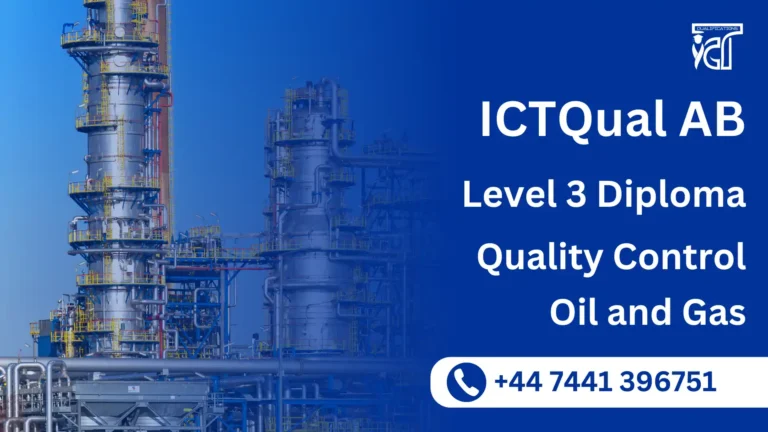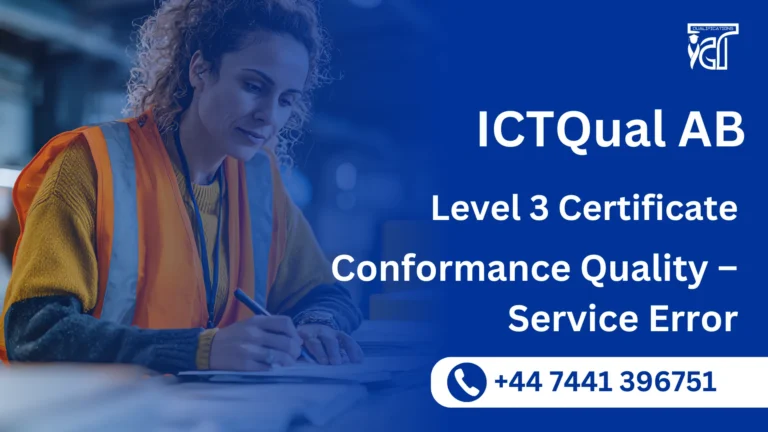In today’s rapidly evolving world, sustainable energy solutions have become more critical than ever. The ICTQual Level 5 Diploma in Advanced Energy Management and Renewable Solutions equips professionals with the skills and knowledge needed to thrive in the growing field of energy management. This qualification is perfect for individuals looking to gain advanced expertise in renewable energy solutions, energy efficiency, and sustainability practices.
Whether you’re looking to advance your career in energy management or make a transition into the renewable energy sector, this course provides a structured and thorough learning experience. In this blog post, we’ll explore the course structure, learning outcomes, benefits, and much more about the ICTQual Level 5 Diploma in Advanced Energy Management and Renewable Solutions.
The ICTQual Level 5 Diploma in Advanced Energy Management and Renewable Solutions is a comprehensive qualification that focuses on developing skills in energy management and the integration of renewable energy solutions. This course is designed for professionals working in the energy sector or those who wish to pursue a career in energy management and sustainability.
The program covers a wide array of topics related to energy usage, energy audits, and the application of renewable energy technologies like solar, wind, and biomass. By completing this course, learners will acquire the skills needed to reduce energy consumption, improve energy efficiency, and implement renewable solutions effectively.
The ICTQual Level 5 Diploma in Advanced Energy Management and Renewable Solutions is a valuable qualification for anyone looking to gain advanced expertise in energy management and renewable energy systems. With the growing importance of sustainability and the shift towards renewable energy, this course will provide you with the knowledge and skills to lead in this dynamic and rewarding field.
Take the first step towards advancing your career in energy management and renewable solutions today by enrolling in the ICTQual Level 5 Diploma in Advanced Energy Management and Renewable Solutions!
ICTQual Level 5 Diploma in Advanced Energy Management and Renewable Solutions
This qualification, the ICTQual Level 5 Diploma in Advanced Energy Management and Renewable Solutions, consists of 10 mandatory units.
| Sr# | Unit Title |
|---|---|
| 1 | Strategic Energy Management Across Industries |
| 2 | Renewable Energy System Integration |
| 3 | Regulatory Frameworks and Compliance |
| 4 | Advanced Sustainability Solutions |
| 5 | Industry-Specific Energy Solutions |
| 6 | Financial and Project Management for Energy Projects |
| 7 | Emerging Technologies and Innovations |
| 8 | Global Case Studies and Best Practices |
| 9 | Practical Workshops and Simulations |
| 10 | Capstone Project |
GLH (Guided Learning Hours) and TQT (Total Qualification Time) are terms commonly used in vocational qualifications to help define the amount of time a learner is expected to spend on their studies.
1. GLH (Guided Learning Hours)
GLH refers to the number of hours a learner spends being directly taught, supervised, or supported during their course. This includes the time spent in activities such as:
- Classroom instruction
- Practical workshops
- One-on-one tutoring or mentoring sessions
- Online learning sessions with tutor support
In other words, GLH represents the time that learners are actively engaged with their instructors or learning activities.
2. TQT (Total Qualification Time)
TQT represents the total amount of time a learner is expected to invest in completing a qualification, including:
- GLH (Guided Learning Hours): Time spent on direct learning, as explained above.
- Self-Directed Learning: This includes time spent on independent study, research, assignment completion, preparation for exams, and any other work the learner does outside of direct teaching hours.
TQT is a broader measure that includes all the time required to achieve the qualification. It helps learners and employers understand the overall commitment required for the qualification.
Key Differences Between GLH and TQT:
- GLH focuses on direct learning with guidance or supervision.
- TQT includes GLH as well as independent study time and other learning-related activities.
Example:
If a qualification has a TQT of 600 hours and a GLH of 250 hours, it means the learner should spend 250 hours in direct learning (classroom, online, or tutor-led sessions) and 350 hours on independent study or research.
Here are the learning outcomes for each study unit:
- Strategic Energy Management Across Industries
- Conduct energy audits and bench marking across various industries.
- Optimize energy efficiency in heavy industries and commercial buildings.
- Implement Energy Performance Contracts (EPCs) in public and private sectors.
- Implement Industrial Energy Management Systems (EnMS) based on ISO 50001 standards.
- Renewable Energy System Integration
- Demonstrate practical skills in the installation and maintenance of solar PV systems across residential, agricultural, and industrial settings.
- Analyse the integration of wind energy systems in coastal regions and rural electrification projects.
- Develop hands-on skills in small-scale hydro power and micro grid systems for remote and off-grid applications.
- Apply practical knowledge of biomass and bioenergy systems in waste-to-energy and bio gas production.
- Design and implement hybrid renewable energy systems for industrial applications.
- Demonstrate critical thinking in evaluating the integration of renewable energy systems.
- Regulatory Frameworks and Compliance
- Conduct a comparative analysis of global energy policies in the EU, USA, China, and developing countries.
- Apply carbon trading and offsetting principles to industries like aviation and logistics.
- Leverage government subsidies and tax incentives for renewable energy projects.
- Conduct energy compliance audits to meet regulatory standards in oil & gas, construction, and utilities sectors.
- Advanced Sustainability Solutions
- Implement circular economy practices in manufacturing and fashion industries.
- Develop and apply strategies to reduce carbon footprints in transportation, logistics, and supply chains.
- Apply energy-efficient design principles in green building projects.
- Integrate renewable energy and sustainability into global supply chains.
- Industry-Specific Energy Solutions
- Develop practical solutions for improving energy efficiency and sustainability in the oil and gas industry.
- Design energy management strategies for the healthcare sector, focusing on hospitals and medical facilities.
- Implement renewable energy solutions in the agriculture and food processing industry.
- Optimize energy use in data centres and the IT industry through energy-efficient cooling and renewable energy integration.
- Design sustainable energy solutions for the transportation and logistics sector.
- Financial and Project Management for Energy Projects
- Conduct feasibility studies for renewable energy projects in various industries.
- Perform cost-benefit analysis (CBA) for renewable energy and energy efficiency projects.
- Evaluate project financing options for renewable energy projects in emerging markets.
- Identify and mitigate risks in energy projects across industries.
- Apply project management principles to energy projects.
- Emerging Technologies and Innovations
- Evaluate the practical applications of energy storage systems in grid stabilization and industrial use.
- Demonstrate the practical applications of green hydrogen production and its integration in heavy industries and transportation.
- Implement smart grid solutions in urban and industrial energy systems.
- Apply AI and machine learning for predictive maintenance and energy optimization in manufacturing and utilities.
- Critically assess the role of emerging technologies in advancing sustainable energy systems.
- Global Case Studies and Best Practices
- Evaluate the role of renewable energy in addressing energy access challenges in developing countries.
- Analyse best practices for industrial decarbonization in developed regions.
- Examine urban energy solutions and their role in creating sustainable smart cities.
- Assess corporate renewable energy procurement strategies and their impact on sustainability goals.
- Practical Workshops and Simulations
- Conduct virtual energy audits for different industries.
- Design renewable energy systems using industry-standard software.
- Simulate compliance audits and negotiations with regulatory bodies.
- Present renewable energy project proposals to mock investors and stakeholders.
- Demonstrate teamwork and collaboration in practical simulations.
- Capstone Project
- Design an industry-specific energy management or renewable energy project.
- Develop a detailed implementation plan for the proposed energy solution.
- Collaborate with industry stakeholders to validate and refine the project.
- Demonstrate project management skills in executing the capstone project.
- Evaluate the potential impact of the proposed energy solution.
Benefits of the ICTQual Level 5 Diploma in Advanced Energy Management and Renewable Solutions
The ICTQual Level 5 Diploma in Advanced Energy Management and Renewable Solutions offers a multitude of benefits, particularly for professionals seeking to excel in the energy sector or transition into the fast-growing renewable energy industry. Below are some key advantages of pursuing this qualification:
1. In-Depth Knowledge of Energy Management
This course provides advanced insights into energy management practices, helping professionals understand how to optimize energy usage in various industries. You’ll gain a comprehensive understanding of energy management strategies, renewable energy technologies, and energy efficiency measures that are applicable to real-world scenarios.
2. Expertise in Renewable Energy Solutions
The diploma covers cutting-edge renewable energy technologies such as solar, wind, hydro, and biomass. By learning how to effectively integrate these solutions into existing energy systems, you’ll be well-equipped to meet the increasing global demand for sustainable energy solutions.
3. Enhanced Career Prospects
Renewable energy and energy management are among the fastest-growing sectors in the global job market. With this qualification, you’ll gain a competitive edge, making you more attractive to employers in a wide range of industries, including utilities, construction, manufacturing, and environmental consultancy.
4. Practical Skills for Real-World Application
The course is designed to provide you with not just theoretical knowledge but also practical skills to conduct energy audits, implement energy-saving measures, and develop carbon reduction strategies. These skills will make you capable of making a tangible impact in any energy management role.
5. Contribution to Global Sustainability
One of the most important benefits of this qualification is the opportunity to contribute to a sustainable future. By learning how to reduce energy consumption, cut carbon emissions, and implement renewable energy technologies, you’ll be directly contributing to sustainability goals, both locally and globally.
6. Flexibility in Learning
The ICTQual Level 5 Diploma offers flexible learning options, allowing you to study at your own pace while balancing work or personal commitments. This flexibility makes the course suitable for working professionals, ensuring you can continue to develop your career without compromising on your current responsibilities.
7. Increased Earning Potential
As the demand for skilled professionals in energy management grows, so does the earning potential. Graduates of this diploma can expect to earn competitive salaries in fields such as energy management, sustainability consultancy, and renewable energy project management.
8. Opportunity for Further Study
Upon successful completion of this diploma, you’ll have the opportunity to pursue advanced qualifications in energy management, sustainability, or renewable energy. This opens doors to a range of higher-level qualifications and career opportunities, including roles in energy consultancy, carbon management, and sustainability strategy.
9. Networking Opportunities
Enrolling in this program connects you with professionals, experts, and fellow students in the energy and sustainability sectors. This network can offer valuable resources, career advice, and job opportunities as you progress in your career.
10. Practical Experience in Carbon Management and Sustainability
With the course’s focus on real-world applications, you will learn strategies for reducing carbon footprints and promoting energy sustainability. This practical experience will be valuable for employers looking for experts who can implement effective carbon management and energy-saving strategies.
Best Fit for the ICTQual Level 5 Diploma in Advanced Energy Management and Renewable Solutions
The ICTQual Level 5 Diploma in Advanced Energy Management and Renewable Solutions is ideal for a variety of professionals seeking to advance their careers in energy management, sustainability, and renewable energy. The following individuals would benefit most from this course:
1. Energy Professionals
If you are already working in energy management or a related field and want to enhance your expertise in advanced energy systems, renewable solutions, and sustainability practices, this course is perfect for you. It will provide you with the in-depth knowledge and skills needed to optimize energy use and integrate renewable solutions effectively within various industries.
2. Environmental Consultants
Environmental consultants looking to expand their service offerings by incorporating energy management and renewable energy solutions into their portfolios will find this course highly beneficial. By gaining specialized knowledge in energy efficiency and sustainability, you’ll be equipped to advise clients on how to reduce energy consumption and carbon footprints.
3. Sustainability Managers and Coordinators
Sustainability managers who wish to deepen their understanding of energy management and renewable energy technologies will gain practical tools and techniques for achieving sustainability goals. This diploma will enable you to lead energy-saving initiatives and implement renewable solutions across organizations.
4. Engineers and Technicians
Engineers and technicians working in fields such as electrical, mechanical, civil, or environmental engineering who are keen to specialize in renewable energy technologies and energy management will find this diploma extremely valuable. It offers practical insights into the design, implementation, and optimization of renewable energy systems.
5. Individuals Looking to Transition into the Renewable Energy Sector
If you have a background in general management, engineering, or another technical field and want to transition into the rapidly growing renewable energy sector, this course is an excellent way to acquire the specialized knowledge and skills necessary to succeed.
6. Project Managers in the Energy Sector
Project managers who oversee energy-related projects can benefit greatly from this course. By gaining knowledge in energy efficiency, renewable energy integration, and energy audits, you will be better equipped to manage projects that involve energy sustainability, carbon management, and energy-saving technologies.
7. Entrepreneurs in the Renewable Energy Industry
If you are an entrepreneur or business owner aiming to launch a renewable energy-focused business or improve energy management practices in your existing organization, this qualification provides the foundation needed to succeed in a competitive and innovative sector.
8. Professionals in Government and Policy Roles
Policy advisors, government officials, and professionals working in environmental regulatory bodies can also benefit from this course. It will provide you with the knowledge needed to influence energy policies, drive green initiatives, and advocate for the adoption of renewable energy solutions at local, national, and international levels.
9. Individuals Passionate About Sustainability and Climate Change
Finally, if you have a passion for sustainability and combating climate change and are eager to make a tangible impact on global energy systems, this course will equip you with the necessary tools to help reduce energy consumption, lower carbon emissions, and promote renewable energy solutions in various industries.
Entry Requirements
Register Now
Qualification Process
Qualification Process for the ICTQual Level 5 Diploma in Advanced Energy Management and Renewable Solutions
Certification:
Upon successful completion of all checks, ICTQUAL AB will issue your official certificate, confirming that you have attained the ICTQual Level 5 Diploma in Advanced Energy Management and Renewable Solutions.
Self-Assessment:
Begin by evaluating your eligibility to ensure you meet the qualification requirements, including work experience, knowledge, and language proficiency.
Registration:
Complete your registration by submitting the required documents, including a scanned copy of a valid ID, and paying the registration fee.
Induction:
An assessor will conduct an induction to confirm your eligibility for the course and explain the evidence requirements. If you do not meet the criteria, your registration will be canceled, and the fee will be refunded.
Assignmnets & Evidence Submission:
Provide all assignmnets and the necessary evidence based on the assessment criteria outlined in the course. If you are unsure of the required evidence, consult with the assessor for guidance on the type and nature of evidence needed.
Feedback and Revision:
The assessor will review your submitted evidence and provide feedback. Evidence that meets the criteria will be marked as “Criteria Met,” while any gaps will be identified. You will be asked to revise and resubmit if needed.
Competence Evidence:
Submit final evidence demonstrating that all learning outcomes have been met. This evidence will be marked as “Criteria Met” by the assessor once it is satisfactory.
Internal Quality Assurance (IQA):
The Internal Quality Assurance Verifier (IQA) will review your evidence to ensure consistency, quality, and compliance with standards.
External Verification:
The IQA will submit your portfolio to ICTQUAL AB External Quality Assurance Verifiers (EQA) for final confirmation. The EQA may contact you directly to verify the authenticity of your evidence.






